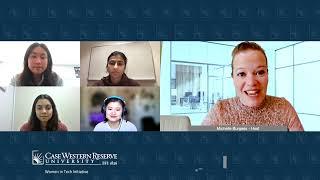Case Western Reserve University’s Women in Tech Initiative continues; this time with a lively conversation with four students who are part of Girls Who Code. We spoke with Joy Fan, CWRU, ’25, Computer Science; Arohi Mehta, CWRU, ’25, Computer Science; Anika Washburn, CWRU, ’22, Computer Science; and Karo Zhu, CWRU, ’22, Computer Science.
What is Girls Who Code?
Anika Washburn: Girls Who Code is a national organization that has chapters at colleges and high schools across the country. The organization provides an online curriculum to us, and we teach it to high school girls in the Cleveland area.
Originally, we hosted around eight sessions at CWRU, and five or six of them would be us teaching them different coding languages, then they had the opportunity to create projects and showcase them.
Tell us about the Arduino workshop.
AW: To take the program a step further, we added the Arduino workshop. An Arduino is a small circuit board that you can program using Arduino IDE, or open-source software. You can create a bunch of different cool applications and projects — small, large, anything you can think of.
Why did you choose to work with the Arduino product?
Karo Zhu: We chose Arduino out of all the hardware choices because it's really user friendly. It's really beginner.
It's such a small thing, but pressing a button and seeing a light pop up is gratifying. Having students go through that process themselves was so amazing. They seem to really enjoy it.
What’s the best part about being involved with Girls Who Code?
Arohi Mehta: Watching all the students be so engaged and proud of what they're doing, and to be able to teach them in a way that they can understand and apply what they learned, was super rewarding. It made us realize that we want to continue this program in the future.
What should students who are interested in participating in the program know?
KZ: We're trying to figure out new ways to get students to join this semester because we're fully remote. We took advantage of that and we expanded the program to work with students from Pennsylvania and Illinois, shipping out materials to them.
In the next few years, we'll get back to in-person meetings and working with Cleveland schools, as soon as we can get more students aware of it.
AW: Before every semester we’ll reach out to the Cleveland-area schools and send them an application to have their students fill out if they're interested.
Joy Fan: One thing we’re looking into is doing some HTML workshops, CSS, JavaScript, anything like that. Due to our remote setting, Arduino has worked well.
KZ: We're always looking to expand our network and get more students involved. If you're interested in getting your school or your students partnered with us, please contact us through our website. We'd be more than happy to have you.
Click here to watch the video feature.


